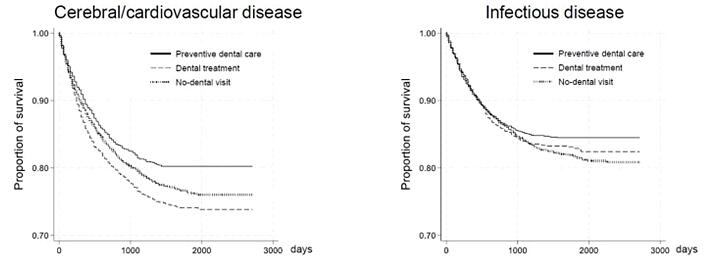In a joint study with Juntendo University, a research group led by Specially Appointed Assistant Professor Risako Mikami, Project Assistant Professor Miho Ishimaru, and Professor Jun Aida of Tokyo Medical and Dental University found that hemodialysis patients receiving dental care had a lower risk of developing cerebral/cardiovascular and infectious diseases than those not receiving it. The work was published in Scientific Reports.

Provided by TMDU
Hemodialysis patients have a high annual crude mortality rate, with the leading causes of death being cerebral/cardiovascular and infectious diseases. Previously, oral diseases such as periodontal disease and dental caries have been reported as factors that may affect mortality in hemodialysis patients. Moreover, periodontal treatment has been reported to reduce cerebral/cardiovascular and infectious diseases in hemodialysis patients. However, the effects of dental treatments other than periodontal treatment have not been studied.
Using a Japanese insurance claim database, the research group divided a total of 10,873 patients undergoing hemodialysis into 3 groups according to their dental care utilization status: 6,152 into the no-dental visit group, 2,221 into the dental treatment group, and 2,500 into the preventive dental care group. The occurrence of cerebral/cardiovascular disease was defined as the occurrence of acute myocardial infarction, heart failure, or cerebral infarction, and the occurrence of infectious diseases was defined as the occurrence of pneumonia or sepsis. The risk levels of developing cerebral/cardiovascular and infectious diseases were compared among the dental care-based groups. The analysis showed that the preventive dental care group had significantly lower incidence rates of cerebral/cardiovascular disease (adjusted hazard ratio 0.86, 95% confidence interval 0.77-0.96) and infectious diseases (adjusted hazard ratio 0.86, 95% confidence interval 0.76-0.97) than the no-dental visit group. In particular, the hazard ratios for pneumonia in the dental treatment group (adjusted hazard ratio 0.80, 95% confidence interval 0.66-0.96) as well as the preventive dental care group (adjusted hazard ratio 0.74, 95% confidence interval 0.61-0.88) were significantly lower than those in the no-dental visit group.
These findings suggest that appropriate dental care utilization may be beneficial in reducing the risk for cerebral/cardiovascular and infectious diseases, which are fatal complications in patients undergoing hemodialysis, and improving their life expectancy. Hemodialysis patients have a low rate of dental care utilization despite their oral environment being prone to deterioration due to restricted water intake and decreased saliva. Healthcare professionals engaging in hemodialysis treatment should recognize the importance of the oral environment and take measures to facilitate oral care and dental visits.
Journal Information
Publication: Scientific Reports
Title: Preventive dental care reduces risk of cardiovascular disease and pneumonia in hemodialysis population: a nationwide claims database analysis
DOI: 10.1038/s41598-024-62735-3
This article has been translated by JST with permission from The Science News Ltd. (https://sci-news.co.jp/). Unauthorized reproduction of the article and photographs is prohibited.




